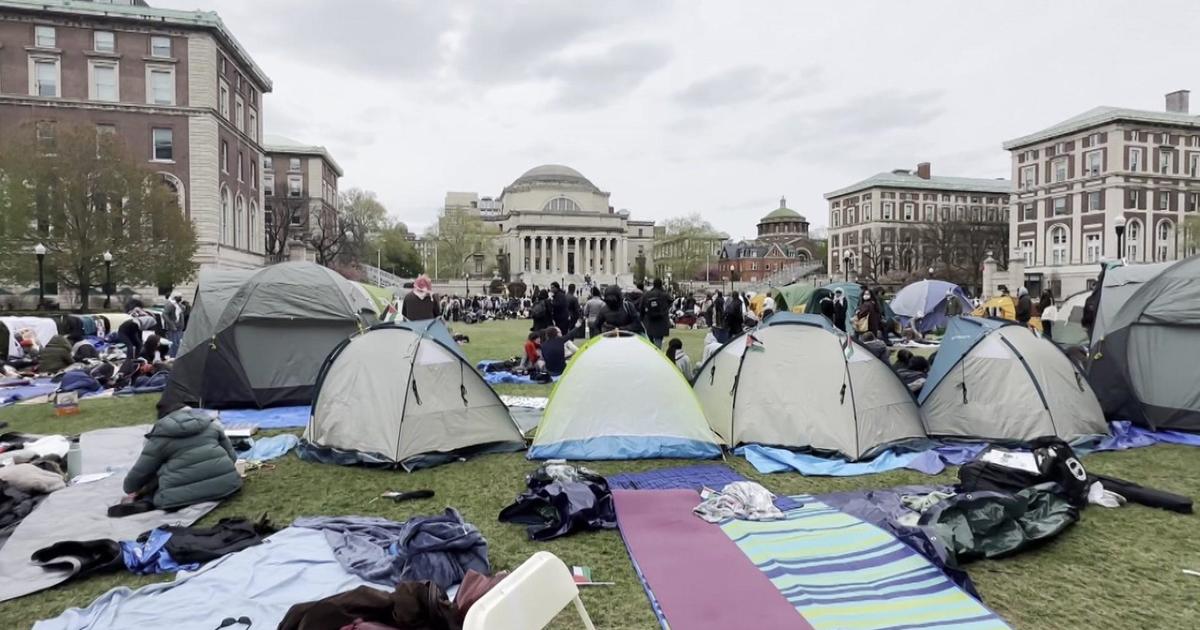The Hard Conversation: Jennifer Jones-Austin Of The Federation Of Protestant Welfare Agencies And The New York Urban League's Arva Rice On NYPD Reforms
NEW YORK (CBSNewYork) - The deadline is fast approaching for police departments across New York state to redesign themselves or lose state funding.
Gov. Andrew Cuomo's executive order gives the police until April 1 to show him their plans.
Some of the people advising the NYPD on its effort include a commission of community leaders.
CBS2's Maurice DuBois asked them to show us what policing will look like.
Jennifer Jones-Austin is CEO and executive director of the Federation of Protestant Welfare Agencies, an anti-poverty group. Arva Rice is president and CEO of the New York Urban League. Along with Robin Hood Foundation CEO Wes Moore, their mission is to fulfill the governor's mandate for reform.
DuBois spoke with Jones-Austin and Rice.
DuBois: It's tough out there, this is a tough position you guys are in. And you know, there's a lot of skepticism. You know, this is New York. So we've been here before, what makes you feel like you have a shot this time?
Jones-Austin: So we understand the skepticism. And that's part of the reason why we jumped into this - Arva, Wes and I. Because we believe that it's critically important in this moment when the nation is appreciating that we just we can't do this anymore.... We can't allow Black and Brown persons to be racialized when it comes to policing, to be marginalized in any aspect or respect, is a concern society, policing, health care, housing, whatever it may be.
More: CBS2 Speaks With Members Of Cure Violence Group Man Up! Inc.
DuBois: That all police departments around the state do this? Do you feel like it's sincere?
Rice: We do know that in the conversations that we've had with the mayor's office, the conversations that we've had with the police department, that they recognize that this moment will not pass without change. This moment will not pass without there being some structural changes to the way that they do policing in New York City. And so whether their efforts are fully sincere or not, the community is is demanding it. And so we're there to serve as the conduit, to be there to make sure that those voices are heard in this critical conversation.
Jones-Austin: Our greatest concern is that this door could close in this moment, and we not have taken the opportunity to push it all the more open. And so we're here to say, you know what? Don't shy away. If ever there was a moment, if ever the nation is paying attention, it is now. This is the time for you to stand up. Have your voice be heard, have your concerns be addressed.
More: Writer David Simon, The Wire Creator, Discusses Policing In America With CBS2's Maurice DuBois
Jones-Austin: Let me also say, we're hearing a lot about the lack of transparency and accountability. I heard it said very well by one of the New York City district attorneys, the persons who are out there, allegedly, who are holding people accountable, must first themselves be accountable. And so we're hearing a lot about the lack of accountability, the lack of transparency, the lack of discipline.
Jones-Austin: We're hearing officers talk about how they're feeling in this moment, how they are at times feeling like getting not prepared for this moment, that, you know, sometimes they're called out to address issues concerning persons with mental health challenges, or they're called out to police homelessness. And they feel very strongly that they're not equipped to handle those matters, and that they're not criminal in nature. But yet, when things go wrong in those circumstances, they're being blamed. And I think it's been good to hear their perspective as well. Because it helps us to appreciate the hurdles that we have to overcome.
DuBois: The Civilian Complaint Review Board, the CCRB. The major complaint about the CCRB is that it has no teeth, right? It just makes recommendations, the commissioner can yea or nay? And then people feel like there's no accountability, how do you make that accountability actually real?
More: Documentary Filmmaker Marshall Curry Discusses Where The Conversation Goes From Here
Rice: For those individuals who have been doing this work for a long time, those folks that are advocates, it's one of the things that always comes to mind when we talk about accountability. How, what are the ways in which we can provide greater accountability, make the CCRB have more powers?
Jones-Austin: We're hearing from advocates in the community say, there should be no discretion there. You know, if the CCRB, an independent body, makes a recommendation, and has done the investigative work to back it up, then that it should have more teeth.
DuBois: So are you leaning toward recommending that the CCRB have final say when it makes a finding?
Jones-Austin: We've heard from people that that that would be a good thing to do. And so we are looking very, very closely at that.
Jones-Austin: In our society, we have responded to poverty by treating it as though it is criminal. And that is why you see in New York City, that the communities with the highest rates of poverty, also are the highest of the community, the highest rates of Black and Brown persons, and the highest rates of justice involvement. We've criminalized poverty.
More: Schomburg Center Releases 'Black Liberation Reading List'
Jones-Austin: What we've seen in some places that they're beginning to look at - what should we be doing to strengthen social services, mental health services, homeless services, as you know, as a way to come up with alternatives to criminalizing poverty?
Rice: There are things that that police officers are asked to do that across the country that they're saying, is that it? Should this really be part of their portfolio?
Rice: So we think that defunding the police means that the police don't need to be involved in every single aspect of things. But the fact is, is that, who do you call it three o'clock in the morning? Who do you call it at five o'clock in the morning when you're having some type of issue? And we think that there should be alternative places to call that do not lead to escalation, violence and killing of our people.
Rice: We have had conversations directly with police officers. There are some morale issues within the department. There are some ways in which people are feeling like their police officers are not being appreciated. Some of the protests led into some direct conflicts with police officers that were difficult for them to to absorb and to manage, which goes back to their training and how they're supported back in their in their police departments.
DuBois: There is one reality, right? Bail reform. The commissioner says, look, shootings are at a 14 year high. He directly blames bail reform, says people right back on the streets just days later, after they've been arrested. What do you say to that?
Jones-Austin: Bail reform is about making sure that people frankly, people with low income or no income are not put behind bars, when they can safely be at home or elsewhere.
Jones-Austin: It has been convenient, here in New York City and across the state, for people who are not in support to blame bail reform. But the numbers haven't shown that that's the correlation, the reason for the tick, the tick up in crime.
More: NYC Public Advocate Jumaane Williams On What's Next When It Comes To Race
DuBois: In your view, should the war on drugs pretty much come to an end and remove police from the drug policing business?
Jones-Austin: This nation has found a way to criminalize Black people at every turn, to keep us out of the workforce to keep us from getting ahead, to keep us from votin,g to disenfranchise us from voting, to just keep us out of any places and spaces. And I say us, as a Black person, well, we can have voice and have power and have influence. It is no different today. You know, now we're seeing with the opioid epidemic, we've now got a health crisis, a public health crisis. And why is that? Because it is white people disproportionately who are affected by the opioid crisis. So we need to dismantle this whole notion that when people become involved with drugs, that it's criminal, and let's treat everybody fairly and equitably in this respect.
Rice: The only thing that I would add to that is the only war that we should be involved in engaged in right now is a war on systemic racism. And we need to be galvanizing every troop.
Rice: This is not about somebody not working harder than another person. This is not about somebody taking advantage of the opportunity that's been given to them. But we live in a system that has been designed and built for one group to benefit over another. And the war needs to be on systematic racism.
DuBois: Guns are still all over this city. And the cops will tell you that they need help and getting those guns off the street. But what do you how do you attack that aspect of this?
More: Black Parents Describe Tough Conversations About Racism With Their Children
Jones-Austin: I think one of our great greatest challenges in policing today is just to put it out there, the fear that some of these police officers have that they're not going to get home at night. And so you know, if they know that there are guns that are out there, I'm not saying that this is the reason for every case concerning Black persons who have been harmed by the police. I'm not suggesting that at all. But I do think that we are operating in this space where there are police officers who are fearing for their lives every day when they show up to work.
DuBois: When this process is over on April 1, what's it going to look like? What is police reform? According to this commission, and according to the NYPD? What's it going to look like? What are people going to be able to take away from this?
Jones-Austin: Policing that is fair, that safe, that's accountable. And that's just for everybody, not just white affluent people, but Black and Brown people, immigrant people, people in the LGBT community. That everybody, as they walk the streets of New York City, can feel like they're being treated fairly and, and responsibly by the police.
Rice: I think that on April 1, as we have been told by many of our advocates, it is the beginning of the process.
As long as we have policing, as long as we have poverty. As long as we have structural racism, we know that we're going to have to continue to do this work.
More From CBS New York:



